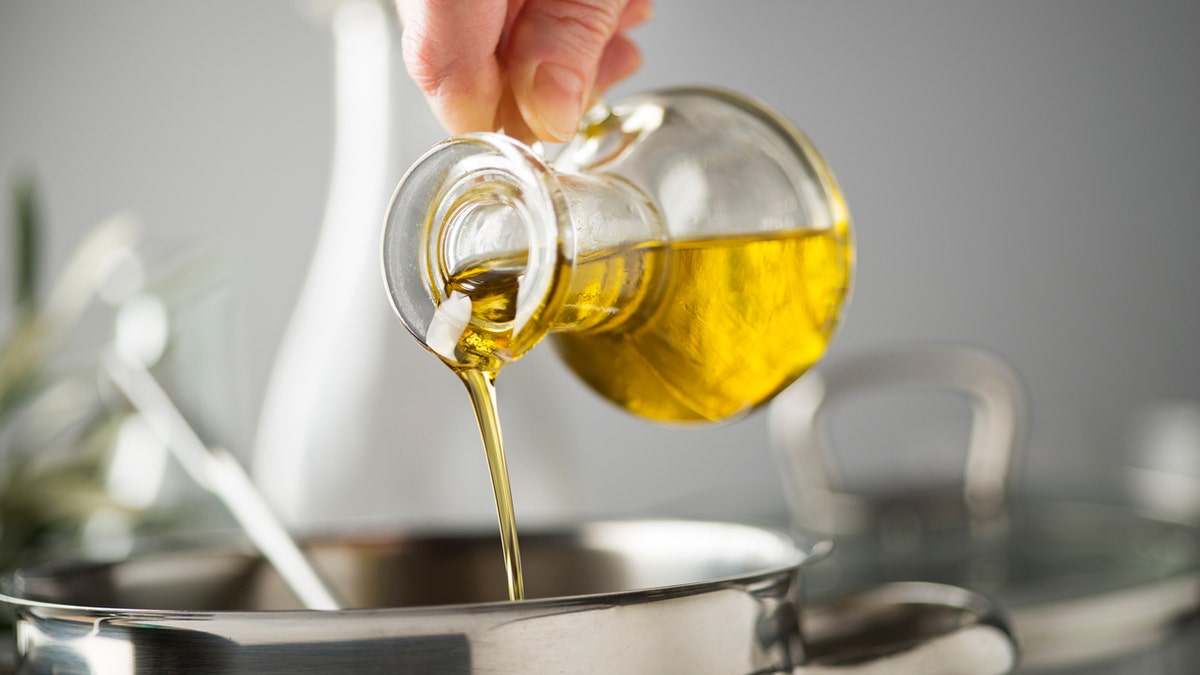NEWYou can now listen to Fox News articles!
Amid MAHA-inspired efforts to reduce ultraprocessed food consumption, seed oils have come under tough scrutiny in recent months — but a new study suggests they may not be all bad.
Researchers from the Indiana University School of Public Health-Bloomington found that linoleic acid — a common omega-6 fatty acid found in a variety of seed oils — could help reduce the risk of heart disease and type 2 diabetes.
Linoleic acid is found in seed oils such as soybean and corn oil, as well as plant foods, according to a press release from the American Society for Nutrition.
COOKING OIL LINKED TO COLON CANCER IN EARLY STUDY, TIED TO INFLAMMATION
"There has been increasing attention on seed oils, with some claiming these oils promote inflammation and raise cardiometabolic risk," said Kevin C. Maki, Ph.D., adjunct professor at the Indiana University School of Public Health-Bloomington and chief scientist at Midwest Biomedical Research, in the release.
"Our study, based on almost 1,900 people, found that higher linoleic acid in blood plasma was associated with lower levels of biomarkers of cardiometabolic risk, including those related to inflammation."

Researchers have found that linoleic acid — a common omega-6 fatty acid found in a variety of seed oils — could help reduce the risk of heart disease and type 2 diabetes. (iStock)
While previous studies have explored the link between linoleic acid and cardiovascular risk factors, this latest research used "objective biomarkers" instead of relying on participants’ self-reported dietary habits, according to Maki.
"We also measured a range of markers of inflammation and indicators of glucose metabolism," he noted.
RESTAURANT CHAIN DITCHES SEED OILS 'LURKING' IN ITS INGREDIENTS
People with higher levels of linoleic acid were found to have lower levels of glucose, insulin and markers of inflammation, the researchers found.
"We saw consistent results across the different biomarkers measured," Maki said. "People with higher levels of linoleic acid in their blood tended to have a healthier overall risk profile for heart disease and diabetes."

Linoleic acid is found in seed oils like soybean and corn oil, as well as plant foods. (iStock)
The findings were presented at NUTRITION 2025, the flagship annual meeting of the American Society for Nutrition that was held May 31-June 3 in Orlando — although the results were preliminary.
"Abstracts presented at NUTRITION 2025 were evaluated and selected by a committee of experts, but have not generally undergone the same peer review process required for publication in a scientific journal," the release stated.
"As such, the findings presented should be considered preliminary until a peer-reviewed publication is available."
DOCTOR REVEALS THE 'HATEFUL 8' SEED OILS THAT COULD HARM YOUR HEALTH
Based on the findings, the researchers called for additional study to confirm whether greater intake of linoleic acid intake reduces the chances of heart attacks, stroke and type 2 diabetes, the release stated.
The team also aims to determine the impact of specific types of oils.

One dietitian recommended using olive oil, noting that there’s a "significant body of evidence" for its use as part of a Mediterranean approach to eating. (iStock)
Michelle Routhenstein, a New York-based registered dietitian who specializes in heart disease, was not involved in the study but shared reaction to the findings.
"As a cardiovascular dietitian, I think this study reinforces what evidence has long suggested: Seed oils are not harmful — in fact, they may be protective of cardiometabolic health," she told Fox News Digital.
"By using blood biomarkers, the research shows that higher linoleic acid levels are linked to lower inflammation and better cardiometabolic health."
"This study supports including seed oils, used in appropriate amounts, as part of a heart-healthy diet."
Routhenstein noted that linoleic acid has been shown to lower LDL cholesterol and support healthy cell membranes.
"It is also associated with lower levels of inflammatory markers like CRP (C-reactive protein)," she said. "These biological effects help explain its cardiometabolic benefits."
BELOVED AMERICAN CANDY DEEMED 'UNSAFE TO EAT' IN UNITED KINGDOM DUE TO HIDDEN CHEMICALS
"This study supports including seed oils, used in appropriate amounts, as part of a heart-healthy diet."
Seed oil cautions from some experts
In a Dec. 2024 study published in the medical journal Gut, the plant-based cooking oils — which are often used in processed, packaged foods — were linked to an increased risk of colon cancer, although dietitians pointed to limitations.
For more Lifestyle articles, visit www.foxnews.com/lifestyle
Meanwhile, California chef and restaurant owner Andrew Gruel has shared his staunch opposition to seed oils in interviews with Fox News Digital, saying the "switch away from seed oils shows this movement is here to stay."
"People have researched the effects of seed oils, tried the alternatives and are now demanding their favorite brands make the switch," Gruel said.

Some have shared cautions about seed oils. In a Dec. 2024 study, the plant-based cooking oils were linked to an increased risk of colon cancer, although dietitians cited limitations. (iStock)
Sherry Coleman Collins, a food allergy dietitian and expert from the Atlanta metropolitan area, suggested the cautions about seed oils may be exaggerated, but did recommend choosing wisely.
CLICK HERE TO SIGN UP FOR OUR LIFESTYLE NEWSLETTER
In terms of cooking oils, Collins recommended using olive oil, noting there’s a "significant body of evidence" for its use as part of a Mediterranean approach to eating.
"Extra-virgin olive oil can be a wonderful, versatile oil to use in low-medium heat cooking. It tastes great and has a very good fatty acid profile," she previously told Fox News Digital.
"For higher-heat cooking, I like avocado and peanut oils for their high smoke point and neutral flavor, and they, too, have good fatty acid profiles."
CLICK HERE TO GET THE FOX NEWS APP
Fox News Digital reached out to the Indiana University researchers for comment.
Peter Burke of Fox News Digital contributed reporting.
Melissa Rudy is senior health editor and a member of the lifestyle team at Fox News Digital. Story tips can be sent to melissa.rudy@fox.com.
.png)
 German (DE)
German (DE)  English (US)
English (US)  Spanish (ES)
Spanish (ES)  French (FR)
French (FR)  Hindi (IN)
Hindi (IN)  Italian (IT)
Italian (IT)  Russian (RU)
Russian (RU)  6 hours ago
1
6 hours ago
1







Comments